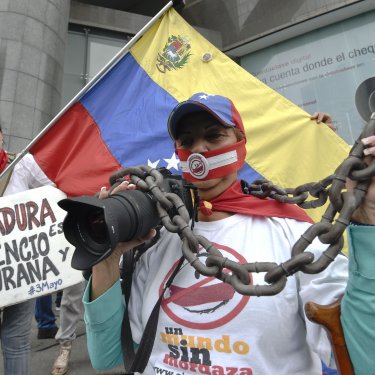Censorship and persecution: net closes on Venezuelan media

Amid a deepening political crisis and continuing opposition street protests against President Nicolas Maduro’s administration, Venezuela’s security forces and paramilitary groups have stepped up efforts to silence the media. Reporters Without Borders (RSF) condemns their attempts to suppress free speech and the freedom to inform.
Members of the police, Bolivarian National Guard, Bolivarian Intelligence Service (SEBIN) and pro-government paramilitary groups have repeatedly targeted, insulted or arbitrarily arrested reporters covering opposition demonstrations, and have seized and destroyed their equipment.
According to the National Press Workers Union (SNTP), the first four months of the year saw more than 200 attacks on journalists. During the most recent national day of protest, no fewer than 19 journalists throughout the country were the victims of acts of aggression by the security forces.
Mounting censorship
In addition to these acts of physical violence, the authorities have been finding other ways to limit media coverage of the protests and to censor independent and opposition media outlets.
Websites and radio stations such as Hit 90.7 FM, Studio 92.1, Punto Fijo Stereo 90.3 and Jet have been closed, while opposition TV stations that have been broadcasting coverage of the protests online, such as Vivo Play, VPI (Venezolanos por la Información) and Capitolio TV, have been blocked or deprived of a broadcast signal by the National Telecommunications Commission (CONATEL).
The same fate was inflicted on foreign TV broadcasters, including Argentina’s TodoNoticias and Colombia’s El Tiempo Televisión, on 19 April. They were the latest international media outlets to be harassed in a range of ways that have included expulsions, the seizure of material and equipment, and censorship.
“The Maduro government’s growing authoritarianism is extremely worrying,” said Emmanuel Colombié, the head of RSF’s Latin America bureau. “Its violent harassment of journalists is in the process of destroying the freedom to inform in Venezuela, a country where it was already very difficult for independent and opposition media to work. The authorities must stop obstructing journalists, whose reporting is vital during such turbulent times.”
Venezuela’s devastating two-year-old economic, social and political crisis has intensified since President Maduro’s abortive attempt in March to transfer power from the National Assembly to the Supreme Court of Justice (TSJ) and thereby govern by decree with no checks and balances.
A climate of widespread violence has accompanied the many demonstrations called by the opposition to demand early general elections without waiting for Maduro’s presidential term to end in December 2018. At least 40 Venezuelans have died during protests since the start of April.
Aside from the censorship, one of the gravest consequences of this persecution of the media is the difficulty that Venezuelans now have in quickly obtaining reliable and objective information about the crisis and about the acts of violence by the government against its own citizens.
Venezuela is ranked 137th out of 180 countries in RSF’s 2017 World Press Freedom Index.



